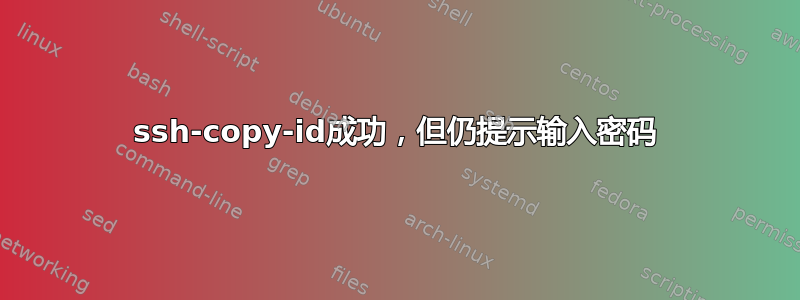
- 我
ssh-copy-id root@c199以前也成功过。 ssh root@c199我可以在没有密码提示的情况下登录- 我想由另一个用户自动登录
ufo(远程机器有该用户) ssh-copy-id ufo@c199要求我输入密码,/usr/bin/ssh-copy-id: INFO: attempting to log in with the new key(s), to filter out any that are already installed /usr/bin/ssh-copy-id: INFO: 1 key(s) remain to be installed -- if you are prompted now it is to install the new keys ufo@c199's password: Number of key(s) added: 1 Now try logging into the machine, with: "ssh 'ufo@c199'" and check to make sure that only the key(s) you wanted were added.但登录
ssh ufo@c199仍提示输入密码。
我尝试通过 ssh 登录 msys2(在 Windows 上)上的远程 centos ,我发现有很多相同的行,例如
ssh-rsa AAAAB3NzaC1yc2EAAAADAQABAAABAQCs7RTfvn83Rxdmvgfh+F4kUlM5FzIUb9rRHaqq11xKIW1gztn/+G4tr+OWl4o6GTW2Z361hIi
ugy8DPtMATN66nTTDUYO0sSvw2BrQfDY4iIENdLpkkHO8KQVGpQE+8tDkaZfD6EQLVtl0uvDE3D77tfcnBLODXgZPQsUSlssMi+pxDbSVjjKgrP
hM1G/L9OTrEHKWDhF+ZBgY1RuLl7ZEdoATbhJaK4FFb9hNn/2CSibVfLts8HJGYQXIQRX/RBzaDZp47sKZvq302ewkkVorNY+c9mmoze6mi8Ip2
zEQOMi6S9zM/yRiD0XZrbmzYfNkoXA03WTmMR/DynVvX2nV /c/Users/xxxx/.ssh/id_rsa
在centos中/home/ufo/.ssh/authorized_keys,
我已将 .ssh 用户的文件夹权限更改为 700 ,将authorized_keys 文件更改为 644 。
相同的 ssh 密钥,ssh root@c199无提示登录,但ssh ufo@c199提示输入密码..
更新
ssh ufo@c199 -vv输出:
....
debug1: Server host key: ecdsa-sha2-nistp256 SHA256:zmCg5vHhBAMd5P4ei82+KsVg072KXbC63C44P0w3zbU
debug1: Host 'c199' is known and matches the ECDSA host key.
debug1: Found key in /c/Users/xxxxx/.ssh/known_hosts:35
debug2: set_newkeys: mode 1
debug1: rekey after 134217728 blocks
debug1: SSH2_MSG_NEWKEYS sent
debug1: expecting SSH2_MSG_NEWKEYS
debug1: SSH2_MSG_NEWKEYS received
debug2: set_newkeys: mode 0
debug1: rekey after 134217728 blocks
debug2: key: /c/Users/xxxxx/.ssh/id_rsa (0x60006bec0), agent
debug2: key: /c/Users/xxxxx/.ssh/id_dsa (0x0)
debug2: key: /c/Users/xxxxx/.ssh/id_ecdsa (0x0)
debug2: key: /c/Users/xxxxx/.ssh/id_ed25519 (0x0)
debug2: service_accept: ssh-userauth
debug1: SSH2_MSG_SERVICE_ACCEPT received
debug1: Authentications that can continue: publickey,gssapi-keyex,gssapi-with-mic,password
debug1: Next authentication method: publickey
debug1: Offering RSA public key: /c/Users/xxxxx/.ssh/id_rsa
debug2: we sent a publickey packet, wait for reply
debug1: Authentications that can continue: publickey,gssapi-keyex,gssapi-with-mic,password
debug1: Trying private key: /c/Users/xxxxx/.ssh/id_dsa
debug1: Trying private key: /c/Users/xxxxx/.ssh/id_ecdsa
debug1: Trying private key: /c/Users/xxxxx/.ssh/id_ed25519
debug2: we did not send a packet, disable method
debug1: Next authentication method: password
答案1
谢谢https://unix.stackexchange.com/a/55481/106419,它告诉我如何调试 ssh。
启用 ssh 调试看看会发生什么
systemctl stop sshd
/usr/sbin/sshd -d -p 22
我发现:
Authentication refused: bad ownership or modes for directory /home/ufo
所有的人只告诉:
/home/ufo/.ssh所有权正确 700/home/ufo/.ssh/authorized_keys所有权正确 600/644
但 sshd 仍然检查用户主文件夹!没有人提到这一点!
sudo chmod 700 /home/ufo解决这个问题。
概括:
您需要确保:
/home/ufo所有权为 700/home/ufo/.ssh所有权为 700/home/ufo/.ssh/authorized_keys所有权为 600
将 ufo 更改为您的主文件夹名称
答案2
我必须将以下内容添加到我的sshd_config文件中:
PubkeyAcceptedKeyTypes=+ssh-dss
然后重新启动sshd。
答案3
显然您没有在用户 ufo 的authorized_keys 文件中添加条目......或者 ~ufo/.ssh 文件/目录的权限错误。
答案4
这是另一种解决方案,以防您无法按照 millican 在其答案中的建议访问或修改 sshd_config 。解决方案是使用 ED25519 算法创建新的 SSH 密钥:
ssh-keygen -t ed25519 -C "[email protected]"
正如所解释的这里。这解决了我的问题,该问题是由于 RSA SHA-1 哈希算法已被弃用而引起的。


